This special issue contains research which navigates the territory between the real and virtual world through metaphor, cognitive model, data stream and a designer’s synergy. (…) In this volume of IJDC we attempted to solicit and select papers that explore that overlapping boundary between the physical and the virtual. In particular, we looked for research that contemplated the role of the subject user versus the machine automaton. The first paper from Maher, Gero, Smith, and Gu’s utilizes agents that sense their environment and react accordingly. What is of particular interest is in how those artificial agents responded to users who inhabit their world. The Heylighen and Segers’ DYNAMO articleBermudez cyberPRINT, a dancer interacts with the virtual manifestation of his physiological data. The performance aims to closely couple the human physical condition and the virtual condition such that, eventually, the boundaries between them are blurred. The article from Fischer and Fischer appropriates a morphogenetic biologic model to digital form finding. The human, in this case acts as a director shaping and nudging largely independent virtual actors. It is in the lack of complete control that we find such systems intriguing...
Oct 19, 2005
EU Commission Commission adopts Green Paper on a new strategy for mental health
The EU Commission adopted a Green Paper on Mental Health on 17 October designed to tackle mental illnesses in Europe. The Green Paper, 'Promoting the mental health of the population: Towards a strategy on mental health for the European Union', aims to launch a public consultation on how better to tackle mental illness and promote mental well-being in the EU.
 Mental illness affects over 27 per cent of European adults every year, and is responsible for the majority of the annual 58,000 deaths by suicide, more than the numbers who die from motor vehicle traffic accidents. Mental health levels can have a significant influence on the economic and social welfare of society. As well as the challenges of mental ill health for the health sector, and the implications for the affected citizens and their families, mental illness imposes significant costs on society and its economic, educational, social, criminal and justice systems. Moreover, stigma and discrimination linked to mental disorders undermine fundamental rights.
Mental illness affects over 27 per cent of European adults every year, and is responsible for the majority of the annual 58,000 deaths by suicide, more than the numbers who die from motor vehicle traffic accidents. Mental health levels can have a significant influence on the economic and social welfare of society. As well as the challenges of mental ill health for the health sector, and the implications for the affected citizens and their families, mental illness imposes significant costs on society and its economic, educational, social, criminal and justice systems. Moreover, stigma and discrimination linked to mental disorders undermine fundamental rights.
A conference to launch the Green paper will be held in Luxembourg on 24 October.
Draft agenda![]()
The launch conference will be followed by three thematic meetings until end of May 2006:
1) Meeting 1: “Promotion and prevention in mental health” (fourth quarter of 2005);
2) Meeting 2: “Social inclusion and fundamental rights in mental health” (first quarter of 2006);
3) Meeting 2: “Information, data and knowledge in mental health” (second quarter of 2006).
15:12 Posted in Positive Technology events | Permalink | Comments (0) | Tags: Positive Technology
Oct 14, 2005
3rd European Conference on Positive Psychology
From Monday July 3rd to Thursday July 6th, 2006, University of Minho (Portugal) will host the 3rd European Conference on Positive Psychology. In this new century, Positive Psychology has become one of the major approaches to the study of individual behaviour and social processes. In this innovative and promising scientific field, a growing number of theoretical, empirical and applied projects are investigating positive psychological issues such as the subjective well-being, creativity, leisure, personal strengths and resources, and their implications on individual, social and community development. This Third European Conference on Positive Psychology provides an opportunity to discuss and develop new theoretical and empirical perspectives, to foster networking among scholars, and to explore new applications of Positive Psychology.
For more information visit the conference's web site
19:18 Posted in Positive Technology events | Permalink | Comments (0) | Tags: Positive Technology
Oct 13, 2005
Intetain 2005 Conference
11:41 Posted in Positive Technology events | Permalink | Comments (0) | Tags: Positive Technology
Oct 11, 2005
Games for Health Conference
The Washington Post reports about the second annual Games for Health Conference, at University of Maryland School of Medicine in Baltimore:
 But some physicians, psychiatrists and public health experts see a more positive side: They're betting electronic games can be adapted as tools to ease medical treatments, improve patient outcomes and boost fitness and knowledge for users young and old. Government agencies including the National Institute on Drug Abuse, the Office of Naval Research and other branches of the Department of Defense are placing bets of their own, funding the development of health-related video games. Some of those projects and others were on display recently at the second annual Games for Health conference at the University of Maryland School of Medicine in Baltimore. Between lectures, participants crowded into two windowless rooms for a first-hand look. In one, they could test themselves on the Kilowatt, an isometric exercise device in which players use body strength to interact with scenes on a video screen - for instance, muscling a car around a race track. In another room, attendees donned a virtual-reality helmet for a simulated plunge into FreeDive, a fantasy underwater world meant to distract pediatric patients from pain or anxiety.
But some physicians, psychiatrists and public health experts see a more positive side: They're betting electronic games can be adapted as tools to ease medical treatments, improve patient outcomes and boost fitness and knowledge for users young and old. Government agencies including the National Institute on Drug Abuse, the Office of Naval Research and other branches of the Department of Defense are placing bets of their own, funding the development of health-related video games. Some of those projects and others were on display recently at the second annual Games for Health conference at the University of Maryland School of Medicine in Baltimore. Between lectures, participants crowded into two windowless rooms for a first-hand look. In one, they could test themselves on the Kilowatt, an isometric exercise device in which players use body strength to interact with scenes on a video screen - for instance, muscling a car around a race track. In another room, attendees donned a virtual-reality helmet for a simulated plunge into FreeDive, a fantasy underwater world meant to distract pediatric patients from pain or anxiety.
More to explore
17:12 Posted in Positive Technology events | Permalink | Comments (0) | Tags: Positive Technology
Oct 03, 2005
Innovations in Stroke Care award goes to VR!
A team of four University of Ulster researchers have won Innovations in Stroke Care Award for using virtual reality in helping people with strokes regain use of their limbs. 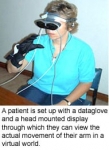 The four who received the Innovations in Stroke Care award are: Jacqueline Crosbie, Professor Suzanne McDonough and Dr Sheila Lennon from the Health and Rehabilitation Sciences Research Institute at Jordanstown along with Dr Michael McNeill from the School of Computing and Information Engineering, at Coleraine.
The four who received the Innovations in Stroke Care award are: Jacqueline Crosbie, Professor Suzanne McDonough and Dr Sheila Lennon from the Health and Rehabilitation Sciences Research Institute at Jordanstown along with Dr Michael McNeill from the School of Computing and Information Engineering, at Coleraine.
Congratulations from Positive Technology!
![]() Tags: virtual reality
Tags: virtual reality
More to explore
23:38 Posted in Positive Technology events | Permalink | Comments (0) | Tags: Positive Technology
Sep 30, 2005
Immersion and Virtual Reality @ Interfaces Montréal
TUESDAY, 4th October 2005 Interface [s] Montréal 5:30pm
From aerospace to surgery, and in all things game related, the simulators and immersion environments developed to serve humankind are indispensable tools that significantly improve human knowledge and enhance our reality experience.

Speakers: Yves Gonthier - Canadian Space Agency; Jean-Claude Artonne - Immervision; Jocelyn Faubert - Université de Montréal, École d'optométrie; Carl-Éric Aubin - École Polytechnique de Montréal, Dép. génie mécanique & CHU Sainte-Justine; Luc Courchesne - Université de Montréal et Ideaction.
[Yves Gonthier]: A Real-Time Simulator for 3D Mental Image Reconstruction On-Board the International Space Station
[Jean-Claude Artonne] Immervision: Panoramic technologies in everyday applications[Jocelyn Faubert] : Understanding human behavior with immersive virtual environments
[Carl-Éric Aubin] Surgical Simulator for the Virtual Prototyping of the Surgical Instrumentation of the Scoliotic Spine
[Luc Courchesne] Panoscope 360°
![]() Tags: virtual reality
Tags: virtual reality
11:50 Posted in Positive Technology events | Permalink | Comments (0) | Tags: Positive Technology
Sep 23, 2005
Scientific American Mind
The new edition of Scientific American Mind
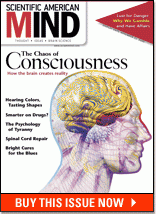
Smarter on Drugs
By Michael S. Gazzaniga
We recoil at the idea of people taking drugs to enhance their intelligence. But why?
The Movie in Your Head
By Christof Koch
Is consciousness a seamless experience or a string of fleeting images, like frames of a movie? The emerging answer will determine whether the "real world" is merely an illusion
Big Answers from Little People
By David Dobbs
In infants, Elizabeth Spelke finds fundamental insights into how men and women think
Custody Disputed
By Robert E. Emery, Randy K. Otto and William O'Donohue
The guidelines judges and psychologists use to decide child custody cases have little basis in science. The system must be rebuilt on better data
Judging Amy and Andy
By Katja Gaschler
Contrary to warnings, we can size up people pretty well based on first impressions
Hearing Colors, Tasting Shapes
By Vilayanur S. Ramachandran and Edward M. Hubbard
People with synesthesia--whose senses blend together--are providing valuable clues to understanding the organization and functions of the human brain
The Psychology of Tyranny
By S. Alexander Haslam and Stephen D. Reicher
Power corrupts, and absolute power corrupts absolutely--or does it?
Mending the Spinal Cord
By Ulrich Kraft
Researchers are finding ways to help nerves regenerate, and hope for therapies is growin
Just a Bit Different
By Ingelore Moeller
With special training early in life, children born with Down syndrome have a higher chance of becoming independent
22:39 Posted in Positive Technology events | Permalink | Comments (0) | Tags: Positive Technology
Sep 22, 2005
Neuroprotection in Neurological Diseases Conference
Neuroprotection in Neurological Diseases - A Promising Therapeutic Strategy or Chimera?
24-26 November 2005
Giardini Naxos (Taormina), Sicily
 Achieving proven Neuroprotection remains an unattained goal; however strategies exist which may delay disease progression in chronic conditions and which show promise of damage limitation in the acute setting. The conference will discuss best treatment practice, present new research and debate issues surrounding Neuronal Plasticity and Neuroprotection.
Achieving proven Neuroprotection remains an unattained goal; however strategies exist which may delay disease progression in chronic conditions and which show promise of damage limitation in the acute setting. The conference will discuss best treatment practice, present new research and debate issues surrounding Neuronal Plasticity and Neuroprotection.
The draft programme is available at www.sinspn.org
13:15 Posted in Positive Technology events | Permalink | Comments (0) | Tags: Positive Technology
Sep 19, 2005
Between the physical and the virtual
via Pasta & Vinegar
The International Journal of Design Computing has a special Issue on the Space Between the Physical and the Virtual:
18:05 Posted in Positive Technology events | Permalink | Comments (0) | Tags: Positive Technology
The added value of eHealth
The International EHTEL conference titled Improving Care for Chronic Conditions - the added value of eHealth will take place in Rome, 10-11 October 2005, jointly organised by EHTEL, the National Research Council of Italy, Institute for Biomedical Technology in co-operation with ESQH and NIZW.
Keynotes of internationally recognised experts and contributions selected by an international Program Committee will be complemented by stakeholder views and open round table panels.
15:16 Posted in Positive Technology events | Permalink | Comments (0) | Tags: Positive Technology
Sep 15, 2005
Mind & Life XIII
The Mind & Life Institute presents: MIND & LIFE XIII Co-hosted by Georgetown University Medical Center and The Johns Hopkins University School of Medicine. The Dalai Lama will participate fully in all sessions.
The Science and Clinical Applications of Meditation DAR Constitution Hall, Washington DC November 8 - 10, 2005 Jointly sponsored by The Mind & Life Institute and CME-accredited by Georgetown University Hospital. The conference builds on the growing interest in meditation within modern medicine and biomedical science that has arisen over the past thirty years and further explores the emerging clinical opportunities.
Conference Sessions
1. Meditation-Based Clinical Interventions: Science, Practice, and Implementation
2. Possible Biological Substrates of Meditation
3. Clinical Research I: Meditation and Mental Health
4. Clinical Research II: Meditation and Physical Health
5. Integration & Final Reflections
Speakers
Ajahn Amaro, B.Sc. — Abhayagiri Monastery
Richard J. Davidson, Ph.D. — University of Wisconsin-Madison
Jon Kabat-Zinn, Ph.D. — U. of Mass. Medical School, Emeritus
Daniel Kahneman, Ph.D. — Princeton University
Helen S. Mayberg, M.D. — Emory University
Robert M. Sapolsky, Ph.D. — Stanford University
Zindel V. Segal, Ph.D. — University of Toronto
David S. Sheps, M.D. — University of Florida
John F. Sheridan, Ph.D. — Ohio State University
Wolf Singer, M.D., Ph.D. — Max-Planck-Institut für Hirnforschung
Ralph Snyderman, M.D. — Duke University Medical Center
Panelists
Jan Chozen Bays, M.D. — Great Vow Zen Monastery
Joan Halifax, Ph.D. — Upaya Zen Center
Father Thomas Keating, OCSO — St. Benedict's Monastery
Margaret E. Kemeny, Ph.D. — University of California-SF
Jack Kornfield, Ph.D. — Spirit Rock Meditation Center
Matthieu Ricard, Ph.D. — Shechen Monastery
Sharon Salzberg, R.N. — Insight Meditation Society
Bennett M. Shapiro, M.D. — Merck Research Laboratories, Emeritus
Esther M. Sternberg, M.D. — National Institute of Mental Health
John D. Teasdale, Ph.D. — MRC Cog. & Brain Sci. Unit, Emeritus
B. Alan Wallace, Ph.D. — Santa Barbara Institute
Mind and Life Dialogues
Mind and Life Institute XIII is the latest in a series of dialogues between scientists, the Dalai Lama, and other Buddhist contemplatives on areas of mutual interest at the intersection of western empirical science and the contemplative traditions and their associated methodologies, psychologies, and philosophies. Prior to 2003, all of these meetings have been held in private; however books describing them have been published and are widely available. Investigating the Mind 2005: The Science and Clinical Applications of Meditation is the second Mind and Life Dialogue that will be open to a large audience, consisting primarily of people working in the fields of medicine, clinical psychology, psychiatry, and neuroscience, as well as students in these fields.
14:57 Posted in Positive Technology events | Permalink | Comments (0) | Tags: Positive Technology
Sep 08, 2005
5th International Conference on Affective Computing and Intelligent Interfaces
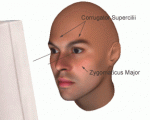
12:15 Posted in Positive Technology events | Permalink | Comments (0) | Tags: Positive Technology
Sep 07, 2005
International Conference on Smart homes and health Telematics
The 2006 edition of ICOST - International Conference on Smart homes and health Telematics - will take place June/July 2006 in Belfast, Northern Ireland. ICOST aims at creating an active research community dedicated to explore how smart homes in particular and health telematics in general can foster independent living and an enhanced life style for elderly and disabled people.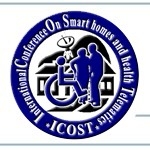
Conference Programme:
- Conference dates: June / July 2006
- Submission of Abstracts (2-4 pages): February 15th 2006
- Notification to authors: March 15th 2006
- Camera Ready Papers: April 15th 2006
11:15 Posted in Positive Technology events | Permalink | Comments (0) | Tags: Positive Technology
Sep 01, 2005
New issue of Psychnology available online
From August 2005 the new issue of PsychNology Journal is available on-line (table of Contents below)
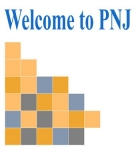
Volume 3, Number 2, 114-222
Special Issue on Space, place and technology: Human Presence in Mediated Experiences (#2)
Editorial Preface
Luciano Gamberini, Giuseppe Riva, & Anna Spagnolli
A Review of How Space Affords Socio-Cognitive Processes during Collaboration
Nicolas Nova
Presence, Place and the Virtual Spectacle
Shaleph O'Neill
Learning Together "There"-Hybrid "Place" as a Conceptual Vantage Point for Understanding Virtual Learning Communities in Higher Education Context
Johanna Pöysä, Joost Lowyck and Päivi Häkkinen
Presence and Mediated Spaces: A Review
Lucia A. Renò
Other Contents
Some Reflections on Learning and E-learning
Cristina Zucchermaglio and Francesca Alby
13:46 Posted in Positive Technology events | Permalink | Comments (0) | Tags: Positive Technology
Aug 05, 2005
2006 South African Conference on Positive Psychology
2006 South African Conference on Positive Psychology will be taking place in April of next year. The aim of the conference is to provide an update on theory, measurement and application in the domain of positive psychology in general, and in particular as pertains individual, social and work wellness in a multi-cultural context.
Key Information about the conference can be found here
19:01 Posted in Positive Technology events | Permalink | Comments (0) | Tags: Positive Technology
Jul 27, 2005
Workshop on Personalisation for e-Health
Via Psychnology
Workshop on Personalisation for e-Health to be held in conjunction with UM 2005 Edinburgh, UK, July 2005
The past years have witnessed unprecedented levels of investment in the e-Health sector, both in terms of research effort, and in terms of funding, as well as a great public interest. e-Health can be broadly defined as the application of IT (especially Internet technologies) to improve the access, efficiency, effectiveness and quality of any processes (clinical and business alike) related to health care. In the e-Health vision, intelligent systems would, for example, enable:
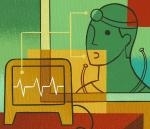 - citizens to take more control of their well-being, by accessing personalised and qualified health information, both medical and pedagogical, and accessing appropriate medical care from their homes;
- citizens to take more control of their well-being, by accessing personalised and qualified health information, both medical and pedagogical, and accessing appropriate medical care from their homes;
- health professionals to manage their activity more efficiently, by receiving relevant and timely updates; and
- teams of health professionals to work together more effectively, coordinating their activities, sharing their knowledge about the patients they are collectively taking care of, and ensuring the best coordinated care is provided.
17:35 Posted in Positive Technology events | Permalink | Comments (0) | Tags: Positive Technology
CHI 2005 - Student Design Competition Results
Via CHI 2005 web site
Computer Human Interaction 2005 Student Design Competition challenged students to design a tool, application or service for elder companionship. The winning team was mPath (Shweta Aneja, Kevin Makice, Apurva Pangam, Matt Weldon, Indiana University, USA). mPath works with administrators of assisted-living facilities to oversee an ad-hoc volunteer network. Interacting with residents, these volunteers assess social relationships and emotional reactions, quantifying for the computer their qualitative observations. In turn, the system examines data over time to isolate anomalies, highlight trends and anticipate future responses. Administrators act upon that information. The overall effect is to increase the social well being of seniors in an unobtrusive manner.
17:15 Posted in Positive Technology events | Permalink | Comments (0) | Tags: Positive Technology
Jul 24, 2005
Siggraph 2005
The 32th Conference on Computer Graphics and Interactive Techniques Siggraph 2005 will be held in Los Angeles, 21 July - 4 August. This year advanced program can be downloaded here.
Unfortunately this year I am not going to attend the conference, but if I would, I could not miss Emerging Technologies. The event, hosted by the Siggraph Conference, presents work from many sub-disciplines of interactive techniques, with a special emphasis on projects that explore science, high-resolution digital-cinema technologies, and interactive art-science narrative.
An ET application I would love to see is Haptic Video, presented by Satoshi Saga and colleagues from Tachi Laboratory, The University of Tokyo. Haptic Video allows to transmit physical operations with the same precision, they say, as language.  "In the recording phase", explain Saga, "position and applied force are recorded as the expert works. This information is transformed into position and impedance information, and archived in a database that can be dynamically interpolated. In the presentation phase, the impedance information is presented to the trainee along the trajectory direction, and virtual fixtures, which are like walls with elasticity, are presented orthogonal to the trajectory direction at the same time. As a result, the trainee tries to cancel the force that the expert exerted, and duplicate the desired force proactively"
"In the recording phase", explain Saga, "position and applied force are recorded as the expert works. This information is transformed into position and impedance information, and archived in a database that can be dynamically interpolated. In the presentation phase, the impedance information is presented to the trainee along the trajectory direction, and virtual fixtures, which are like walls with elasticity, are presented orthogonal to the trajectory direction at the same time. As a result, the trainee tries to cancel the force that the expert exerted, and duplicate the desired force proactively"
According to the researchers, Haptic Video demonstrates how humans can use technology to improve their skills in a wide variety of professional and aesthetic fields, from medicine to calligraphy to etiquette.
I also believe that Haptic Video meets all the requirements of a Positive Technology. I foresee applications of this new technology in the field of healthcare, i.e. in distance rehabilitation and telemedicine.
So good luck to Haptic Video
20:20 Posted in Positive Technology events | Permalink | Comments (0) | Tags: Positive Technology
Jul 22, 2005
Mixed and Augmented Reality Conference
The 4th IEEE and ACM International Symposium on Mixed and Augmented Reality (ISMAR 05) will be held from October 5-8, 2005, in Vienna, Austria. Sponsored by IEEE Computer Society and the Österreichische Akademie der Wissenschaften, the conference covers latest developments in the fields of augmented and virtual reality. Over the last decade, these technologies have evolved from experimental technologies to mainstream research activities that are starting to show impact on industry and society. By their very nature, Mixed Reality and Augmented Reality are highly interdisciplinary fields involving signal processing, computer vision, computer graphics, user interfaces, human factors, wearable computing, mobile computing, computer networks, distributed computing, information access, information visualization, and hardware design for new displays and sensors.
16:38 Posted in Positive Technology events | Permalink | Comments (0) | Tags: Positive Technology
Jul 19, 2005
The Fifth International Conference on Gerontechnology
The fifth international conference on Gerontechnology took place in Nagoya May 24-27 2005. The slogan of the conference was "Technology for smart aging - For a long and happy life with health and self-esteem". The conference program included sessions like Universal Design, Mobility, Home care and Living, Health care and Robotics for Human Support. Topics like Work and Leisure were also treated.
Use of new information technology (IT) solutions was taken up in most of the presentations. The goal could be to provide elderly people with information about preventive care, help them get useful information when moving around outdoors or handling activities of daily living. It was shown that IT and Assistive Technology (AT) could be used to counteract the triggering factors that normally result in hospitalisation and long time care.
The Design for All and Inclusive design approaches were constantly referred to because it was shown that the elderly people had to be able to use new technology and services themselves. Use of Design for All or Inclusive design strategies and methods ensure that mainstream products, services and environments are accessible to the largest number of people.
Organiser of the conference was the International Society for Gerontechnology ISG.
More to explore:
Links to the conference abstracts:sts.bwk.tue.nl/gerontech/Full_text/Volume_3/nr_4/Contents...
12:32 Posted in Positive Technology events | Permalink | Comments (0) | Tags: Positive Technology







